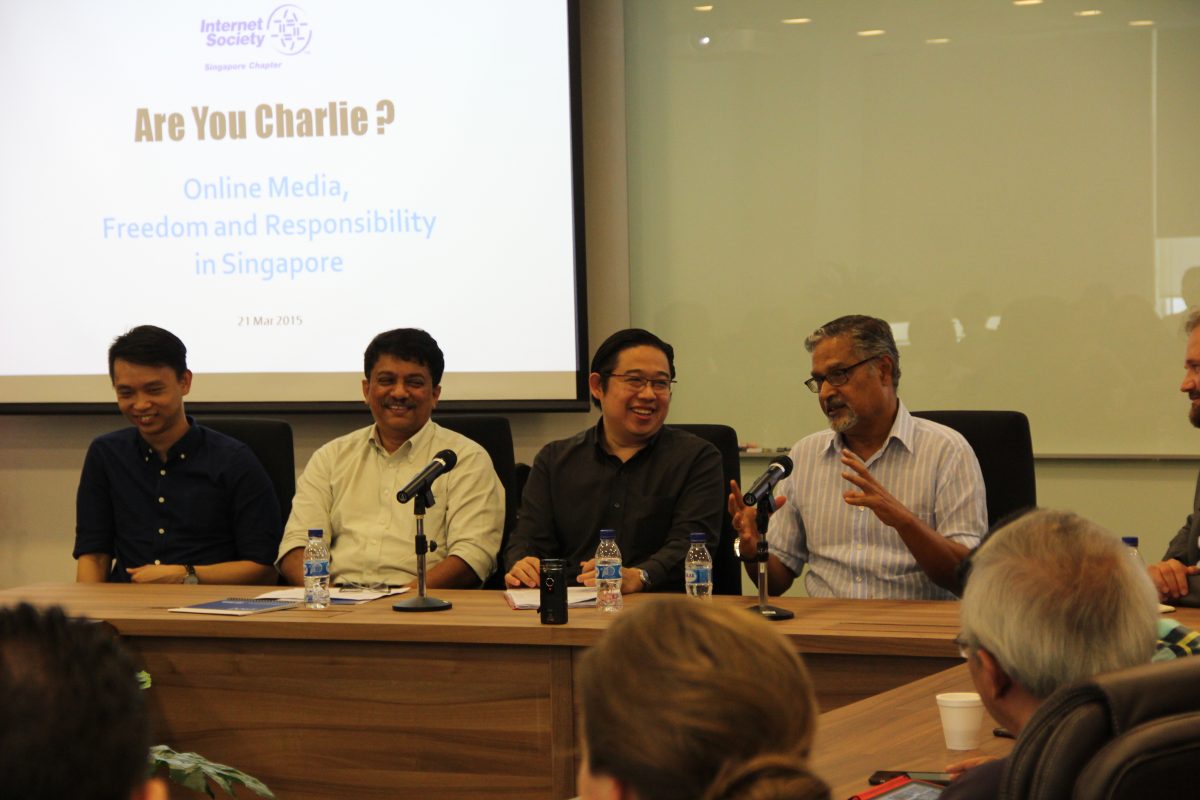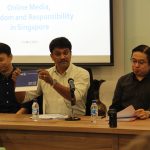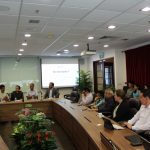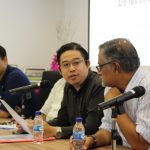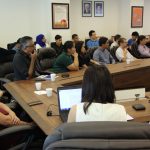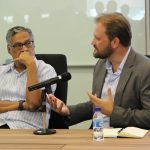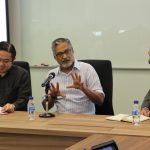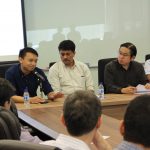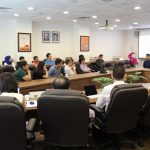We conducted the Panel Discussion “Are you Charlie? Online Media, Freedom and Responsibility in Singapore” on Saturday morning 21 March 2015.
The panel discussed key developments overseas like that of e-citizenship by Estonia and the recent Charlie Hebdo incident, and its implications for Singapore’s smart nation initiative, online citizenship and whether freedom should be tempered by responsibility.
Moderator: Mr Nicholas Aaron Khoo, President, Singapore Computer Society IDM Chapter; Former Blogger, CNET
Panelists: Mr Harish Pillay, President, ISOC Singapore
Mr Belmont Lay, Editor, Mothership.SG
Mr P N Balji, Editor, The Independent Singapore
Mr Mark Worthington, Managing Director, Bell Pottinger, Singapore
- Harish Pillay (centre) in action at our workshop on ‘Are You Charlie’
- Mr Nicholas Aaron Khoo, and Mr P N Balji
- Mr P N Balji, Mr Mark Worthington
- Mr P N Baliji
- Mr Belmont Lay, Mr Harish Pillay, Mr Nicholas Aaron Khoo
- Mr Harish Pillay. Mr Nicholas Aaron Khoo, and Mr P N Balji
ISOC Seminar: Are you Charlie? Online Media, Freedom and Responsibility in Singapore, 21 March 2015
The session began with a welcome by the President of Internet Society Singapore Chapter (Mr Harish Pillay) on the currency and relevance of the topic to the Chapter and Singapore. This was followed by an introduction by the moderator (Mr Nicholas Khoo) on issues emanating from the Charlie Hebdo incident. Key questions revolved around the role of the media, its responsibility to inform rather than to inflame and the related issue of online regulation. References were made to David Putnam’s proposition to extend Duty-of-Care to social media actors, and the practice of governments in extending defamatory laws to online citizens. Suggestions on self-regulation and community governance were posited. The moderator fielded four questions which elicited responses from the panelists. The panellists were: Mr Harish Pillay, President Internet Society Singapore Chapter; Mr P N Balji, Editor, The Independent Singapore; Mr Belmont Lay, Editor, Mothership.SG; and Mr Mark Worthington, Managing Director, Bell Potinger, Singapore. A Q&A session followed the panel discussion.
(1) The first question was on the moral right to exercise unbridled freedom of speech in the manner demonstrated by Charlie Hebdo.
Panelists were challenged to share their thoughts on freedom of speech and self-expression and if these need to be ring fenced to safeguard democracy. All panelists felt that there was a streak of Charlie in them albeit there was a need for it to be situated in the larger social consciousness of society for the common good. The internal conflict was inevitable but often the choice had to be made by the author/writer (Charlie) who bore the burden to communicate. One panelist argued that reporting in conflict zones always meant that someone on the other side took offense regardless. Media was intended to give people a voice but tragically it also paints a black and white picture of reality when it is but “50 shades of grey.”
Another argued that while every media professional aspired to exercise freedom, it did not license them to say whatever they wanted. One had to situate their freedom in the larger context of the values that their respective societies cherished. Media professionals were constantly exposed to photographs and stories which required care in communication as it could be easily misconstrued in a multi-religious and multicultural environment. As responsible editors, there is a moral obligation to inform rather than to inflame.
One panelist argued that “self-preservation” more than monetary returns would be the determining factor in choosing to publish an inflammatory story and therefore pointed in the direction of government regulation in defining individual freedom. Another panelist took a contrarian position and qualified the distinction between the freedom to speak and the right to be heard. He argued for the universality of the freedom of speech but not for the right to be heard or followed. Akin to “open-source” management, the right to exit or to ignore, he reckoned offered the best pathway for conflict resolution. He held that society should not curtail the freedom of speech because someone else does not like it, but perhaps individuals should be given the right of reply if they feel offended. Some felt that the swarm personality of the web and the information deluge online impeded a neat application of the right of reply. Even if the individual who was implicated ignored the site or a story, it would impose on society writ large. The latter would regard them as facts if these were not contested.
(2) On the question of whether online and social media required a watermark
In the first instance, one argued that media actors had imperceptible, but immense influence on society and hence moral responsibility was inherent. Social media participants, however, may not be all too cognizant of the footprint and the impact of what they publish online. People who share information online may not be entirely aware of the consequences of their actions. Opinions can take on the veneer of fact. Irresponsible statements on corporationscan wipe a billion dollars off the stock market of a company overnight. The online space was unchartered territory, and it remains unclear as to how “watermarks” can be enforced. Media freedom in the context of Singapore was a genie that has been locked up for so many years and hence the online space was expected to go berserk for a while before it stabilizes into order.
Another argued that in the absence of debate and public consultation, precedence rather than rights will define the watermarks. By way of illustration, it was common knowledge that one keeps to the left when taking the escalator on the MRT. This was a type of a watermark. However would one have the right to block a camera (with a flash light perhaps) that was impinging on his private movements in a public space? Others argued that the slow and calibrated transition of the mainstream media to the social media space in Singapore had forced an explosion of alternative channels. For a sustainable watermark to emerge, the mainstream media has to be active in this space. If the mainstream media has not moved, then the watermark that was negotiated will suffer double standards.
While panelists firmly believed that society would eventually arrive at a kind of a watermark, there were concerns that the lines of authority were also blurring. This was primarily due to a generational change as younger Singaporeans were seemingly more defiant and independent and shared a different information value system.
(3) On existing frameworks in Singapore and the need for alternatives including that of self-governance, most argued for less regulation.
The young and the restless would require some experimental space and would prefer the absence of a “big eye’’ when engaging with others online. One argued that while Mothership.SG was regulated, The Real Singapore does not get regulated. Regulated sites exercise a significant degree of self-censorship while unregulated sites have a freefall till the Sedition Act hits them. Regulation, on the whole, may not reel in the desired impact and creates a more undulated online environment.
There was a definite proposition from the panelists to step up literacy and educational efforts to inculcate responsibility online. Panelists concurred that education was the best way forward and in a short-cycle environment, this would proliferate fairly quickly, particularly among the young. Teachers and students alike should be educated to distinguish the real from the fake. Literacy must, therefore, focus on enabling readers to become more discerning of headlines of news stories and to be able to have the smarts in them. Salacious headlines even in mainstream news draw attention but seldom carried a related and relevant story. Online sharing behavior needs amends. All too often people share headline stories that they have not read. Was the consumer sufficiently clued in? Education should extend to editorial ethics as increasingly articles even in mainstream media fail to provide a balance of views.
One panelist cautioned the move towards government directed regulation as the track record of this has been repressive. He also questioned the legitimacy of self-regulation or community control as mainstream media would ignore it. There was the related issue of reversing archaic laws which were hardly applicable to the social media environment. As an antidote to regulation, another suggested a code of conduct derived from social media actors and journalists rather than laws imposed on them by an external party or organization. Citing the media environment in UK which was comparatively free, he argued that people in UK craved for more self-regulation. Albeit his key takeaway was that when the BBC introduced editorial guidelines it changed the way journalists reported stories. It was no longer what the journalist wanted but what the people wanted. Journalists had to act in the public interest and treat information as a public good.
(4) On the question of whether there was a need for a more nuanced tool like the duty of care rather than the sledgehammer approach to online governance
Some felt that a community centered approach will not work. Consensus gathering was a long drawn process which would diffuse ownership. Users, journalists, and media owners would need to subscribe equally to the rules of the game for it to succeed. It was also difficult to enforce a code of conduct on social media actors as there were no clear lines of control across territorial jurisdictions.
However, the panelists felt that it might be applicable to registered professional organizations and institutions rather than general bloggers. Panelists differed on the need and practicality of a self-imposed code of conduct. One argued that the online was as real as the onsite and a generic rule of thumb set of guidelines applied to both online citizens and journalists alike reporting a story. It would be possible if it was done consultatively, and content creators could decide on a code of conduct and influence its application. IPSO in UK for instance had taken the lead and triggered a process of change.
Another cautioned that if the government gave up its control over the media, journalists might not know how to handle their newfound freedom. This might not augur well for the society as a whole.
Q & A Session
The interaction with the participants raised several critical issues around education and regulation. Among the proposals were to encourage undergraduates to think critically and discriminate between fact and hearsay. Education must begin in schools as the current generation are digital natives. Online ethics must feature prominently in formal education.
One suggestion was to put students through the exercise of starting up a Wikipedia page as it would provide a humbling experience and expose online citizens to the intricacies of fact validation and subject them to community guidance. It was agreed that the democratization of ethics education online was as important as the democratization of speech on the Internet and this could be best done via Wikipedia creation exercises or campaigns.
Others felt that education at home was equally important as parents do not spend enough time with their children when they log onto the internet. There was a consensus that ethics must be taught in a wider context and not limited to the internet. Social media editors would need to promote ethical readership, as well as ethical authorship. There was also a need to arm all social media actors with the tools that will help them to participate positively on the net. Several professionals felt that the issue should not be one of law, but one of maturity and the buck should stop with the individual rather than the state.
Participants felt that community campaigns against unethical behavior could have unintended consequences. The campaign to name and shame pedophiles in the UK was a case in point. A mob went to a little clinic and dragged out the pediatrician mistaking pediatric with pedophile and had him beaten badly. Hence safety and security was jeopardized and encouraged “lone wolf” responses.
Some however felt that online ranting was a safer alternative than physical violence in the streets. Should the online space be an avenue for pent up feelings which can otherwise become far more explosive or should there be a certain degree of tolerance for misbehavior online? Most participants felt that behavior online should not be any different from offline behavior as one extends to the other, and they were connected spaces rather than distinct ones.
Related to this was the issue of imposing the Sedition Act on hate speech online. Some argued that sharing and repeating inflammatory speech was as wrong as articulating it. Participants felt that social citizens must first be educated, but they must also be allowed to retract their statements if they were advised to do so. Disclaimers on the validity and accuracy of the information could also be posted though it should not absolve one from irresponsible behaviour. “Marketspeak” in journalism for example was a technique which could be seen as an attempt to absolve ownership.
Participants called for a more refined approach to ensure that the search for the truth was more important than the truth itself as in some cases there was no way of establishing the truth. Perhaps where issues were controversial, online citizens could seek verification rather than discuss them with facts. Online citizens need to be taught to do their own primary sourcing, and ultimately everyone could be doing the job of a journalist for themselves.
Some argued that offering differing points of view on the online space was a valuable intellectual exercise so that the truth can be better understood and rationalized, rather than regurgitated as a fact. Curtailing alternative views may obstruct the journey to the truth and hence freedom of diverse views online should be promoted albeit done in a respectful and orderly fashion. Concerns were raised on whether a counter-narrative would be perceived as anti-government. Participants felt that it was important to be pro-Singapore rather than pro-government, but cautioned the growing misperception that anti-government was good journalism. This was equally wrong.
Reference was made to Reynolds v Times Newspapers Ltd case. Reynolds v Times Newspapers Ltd was a House of Lords case in English defamation law which amplified the notion of “qualified privilege” for publication of defamatory statements in the public interest. The privilege applied to published articles not because they concern political speech but because they pertain to information of public interest which the press had a duty to inform the public about and which the public had a corresponding interest to receive such information. The case provided the Reynolds defence, which could be raised where it was clear that the journalist had a duty to publish an allegation even if it turned out to be wrong. The Defamation Act of 2013 (UK) however abolished the common law defence of Qualified Privilege, known as the ‘Reynolds defence’ and was now replaced by the defence of “Publication on matters of public interest” under the Act. Panelists qualified that the case had never been applied to citizens only to media organisations. The issue was whether there should be guidelines or code-of-conduct that govern publication on matters of public interest.
Also, participants asked about available safety nets if both education and regulation failed to deliver the intended outcomes. While there were no ready answers to the above, there was a consensus that Singapore has reached 50 years of maturity and hence citizens together with government would need to evolve mature responses to the challenges facing media and society rather being at the receiving end of government regulation. Some shared that the start of this conversation was in itself groundbreaking as it would not have happened in closed or undemocratic societies.
– Harish Pillay, President of Internet Society Singapore Chapter

